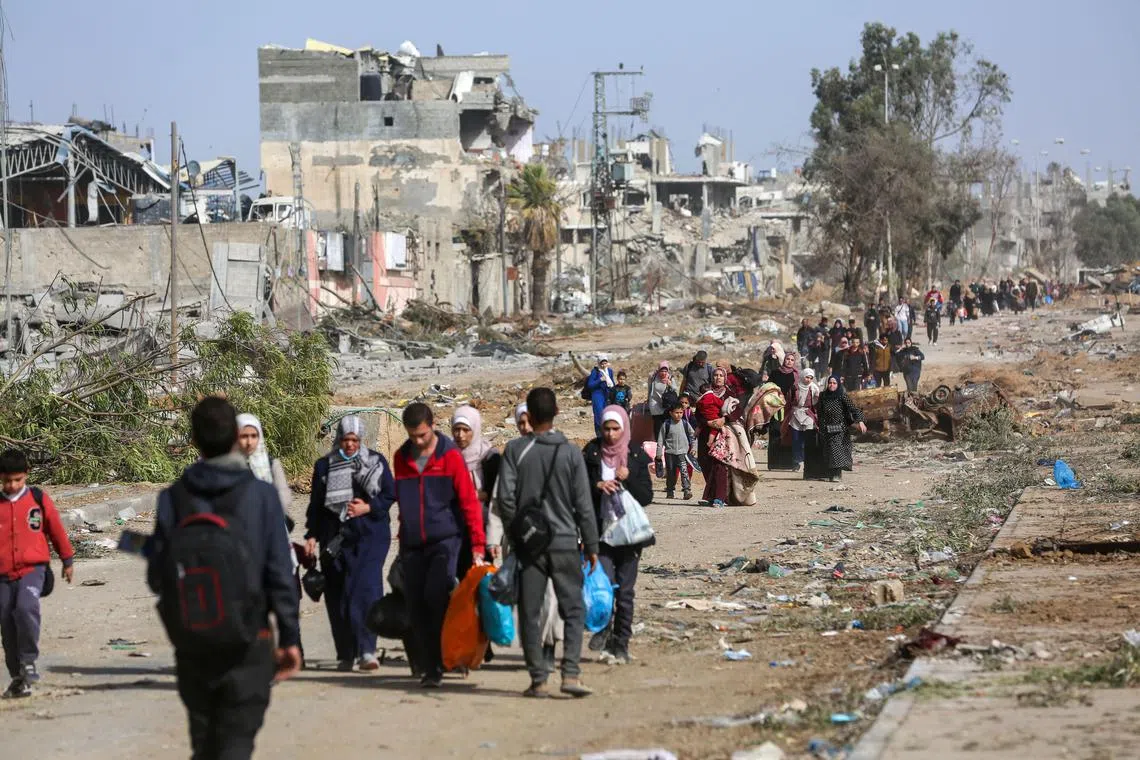EU says Israel’s attack on Hamas is ‘seeding hate’ for years
Sign up now: Get ST's newsletters delivered to your inbox

Israel’s offensive in Gaza has killed more than 25,000 people and displaced most of the enclave's population.
PHOTO: NYTIMES
BRUSSELS – Israel’s attack on Hamas is failing to root out the militant group, the European Union’s top foreign policy chief said, as Prime Minister Benjamin Netanyahu comes under mounting international pressure for rejecting Palestinian rule of Gaza after the war.
Instead of destroying Hamas, Israel is “seeding the hate for generations” with its retaliatory strikes on the militant group in Gaza, Mr Josep Borrell told reporters on Jan 22.
His comments came ahead of a meeting of EU foreign ministers in Brussels.
EU’s foreign policy chief urged parties to start thinking more concretely about a two-state peace process.
Hamas gunmen attacked southern Israel on Oct 7,
Israel responded to that assault with an aerial and ground offensive on Gaza, which is ruled by Hamas.
Israel’s military operation has killed at least 25,000 people in the enclave, according to Gaza’s Health Ministry. It has also displaced most of Gaza’s population of 2.3 million people.
In mid-December, the World Bank estimated Israeli bombardment had damaged or destroyed over 60 per cent of Gaza’s infrastructure.
With civilian deaths soaring and concerns growing about the war spiralling between Israel, Iran and its proxies and US forces, Israel is coming under increasing pressure, including from close allies, for rejecting Palestinian statehood after the war on Hamas.
Mr Netanyahu said last week Israel would insist on keeping security control of both Gaza and the West Bank
Those comments prompted a rebuke from the US State Department, while British Defence Secretary Grant Shapps told the BBC on Jan 21 it was “very disappointing”.
The sentiments were echoed by EU foreign ministers on Jan 22 ahead of a meeting in Brussels, where they will be joined throughout the day by the top envoys from Israel, Saudi Arabia, Jordan and Egypt, as well as the Palestinian Authority and the Arab League.
Luxembourg’s Foreign Minister Xavier Bettel said if the Israelis do not think a two-state solution is an answer, then “they’re very isolated”.
“The support for Israel is at risk to shrink very quickly to a very low level,” Mr Bettel said, adding it is in their interest to come to the table.
The EU’s foreign policy arm has proposed ideas about a two-state solution to the bloc’s member states, including how countries might be able to impose conditions in the future to safeguard that solution, according to a senior EU official.
Israel rebuffed a settlement for post-war Gaza proposed by five Arab nations with US backing. The framework being pushed by the Gulf states of Saudi Arabia, the United Arab Emirates and Qatar, together with Israel’s neighbours Egypt and Jordan, offers aid on condition the Israeli government works towards Palestinian statehood.
Asked about the Israeli government’s rejection of a Palestinian state, Mr Borrell stressed the solution has been approved by the United Nations and the international community.
“So they don’t agree, we have to discuss,” Mr Borrell said. “Which are the other solutions they have in mind? To make all the Palestinians leave? To kill them?”
Belgian Foreign Minister Hadja Lahbib said Belgium planned to organise a peace conference in Brussels in the near future, with the hopes of “restarting political dialogue”.
Several ministers of EU member states also renewed calls for the release of the Israel hostages held by Hamas. BLOOMBERG


